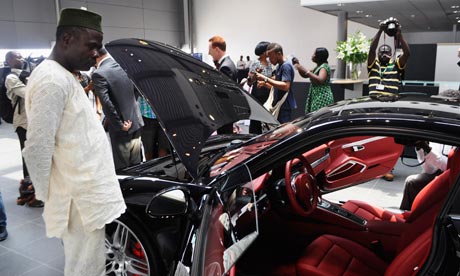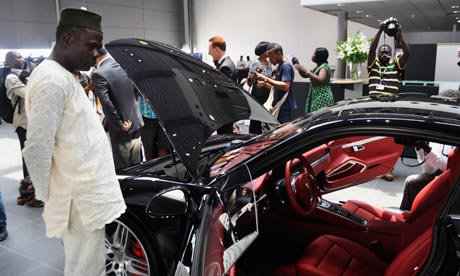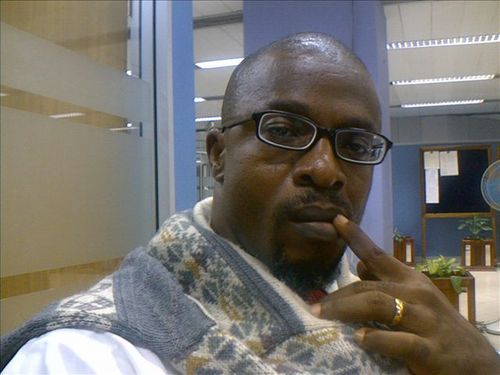
ONE: As Boko Haram’s rampage continues more and more analytical essays devoted to examining the group and it’s impact on Nigerian society are popping up. This most recent one claims that Boko Haram is run by a council of 10 men and has been spilt into two main cells. One cell is more “traditional” lead by a Abubakar Shekau and concentrates on police, political leaders and corrupt imams. On the other hand the “internationalist” cell said to be lead by a Mamman Nur, has the links to international terror groups. Nur is thought to be behind the change in Boko Haram’s methods that emerged after the suicide attack on the United Nations building in Abuja last year. The spate of suicide bombings and coordinated attacks involving booby-trapped cars is credited to the “internationalist” cell. This piece argues that at the risk of alienating local communities in Northern Nigeria, Boko Haram’s strategy of fear may be backed by a few power hungry Nigerians and shows the kind of measures some are willing to use in order to gain power, position and wealth.
TWO: In order to prevent Shell workers from reaching oil rigs around 1,000 protesters blocked waterways in the Niger Delta. The protest staged by people from the Nembe community was done as a warning to Shell due to the lack of electricity, potable water and other basic amenities in the community. Some Shell workers were seized by the protestors but it was assured that they would not be harmed.
THREE: In Abuja, students from the University of Abuja launched a protest following the suspension of courses at the Faculties of Medicine, Agriculture, Veterinary Medicine and Engineering by the Minister of Education Prof. Ruqayyatu Rufa’i due to apparent lack of facilities and accreditation by the National Universities Commission. The protesting students called for the removal of Prof. James Adelabu the Vice Chancellor of the university and a reversal of the suspension. The students’ protest eventually lead to the institution to be shut down by authorities.That wasn’t the end, as the students continued protesting and took their protest to the Federal Ministry of Education, Prof. Joseph Adelabu was given six months to restructure the affected departments by the Minister of Education.
FOUR: Nigeria may be heading towards “fundamentalism” due to recent changes in expressions of religiosity as can be seen in the “Christian fear of an impending caliphate to agitation for Sharia law” and the regular citing of either the Bible or the Quran by activists appealing to leaders. While radical agenda fuels violences, this impending religious fundamentalism from both Christians and Muslims in Nigeria may not necessarily be a bad thing.
FIVE: A consortium of Nigerian telecommunication operators, comprising MTN, Airtel and Glo, may take the federal government to court by December 2013 should the government not improve public power supply. According to the operators, poor electricity supply would cost them N45.9 billion in 2012 due to purchase diesel as fuel for the generators at their base transceiver station (BTS) sites.
SIX: Nigeria, alongside India, China, Indonesia and the United States is to lead the world’s growth in urban populations in the next four decades according to the United Nations. The UN has released this forecast for urban populations in order to urge global leaders to consider creating plans to produce sustainable cities ahead of this population surge. In Nigeria, cities are expected to grow by 200 million people by 2050.
SEVEN: Porsche opened a new dealership in Lagos in mid-March, targeting Nigeria’s super-rich elite. The Lagos dealership is Porsche’s second dealership in West Africa.
EIGHT: Governor Isa Yuguda, of Bauchi State recently announced the appointment of 94 Senior Special Assistants, 20 Special Advisers and 810 Special Assistants, together this results in the appointment of 924 political aides. Furthermore, the Secretary to the State Government, Ahmed Dandija also announced the appointment of 24 more political aides while the governor approved the appointment of 20 Deputy Chairmen and 82 members for state Local Councils. The total number of new appointment is a boggling 1050. There has been public outrage from the civil society towards this.
NINE: The State Security Service (SSS) were able to detect 60 bombs in Gombe State due to a tip-off and thus stop them from going off on the eve of Good Friday, nevertheless this Easter has been described as “bloody”. In Gombe State, the SSS were able to capture four suspect “over the intended attack” but despite the warnings and beefing up of security around churches over Easter due to Boko Haram’s threats, dozens were killed and injured after a car-bomb went off in Kaduna on Easter Sunday catching mostly motorcycle taxi drivers and passers-by. Though no one claimed responsibility for the explosion, Boko Haram is the natural suspect. The bomb went off while Kaduna’s main churches were holding Easter services, it seems terrorist attacks during religious holidays in Nigeria have become a frequent occurrence. Senator, General Muhammed Sani Salleh from Kaduna Central District has called the current insurgency in Nigeria a “war situation”.
TEN: A relevant interview with the Minister of Defence, Dr. Bello Haliru Mohammed.


